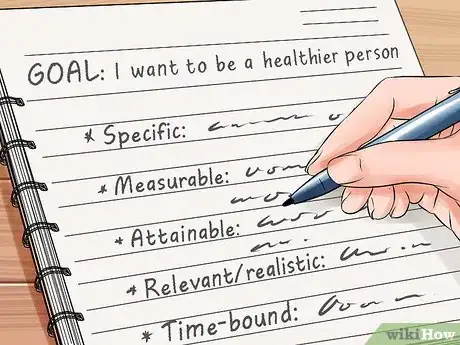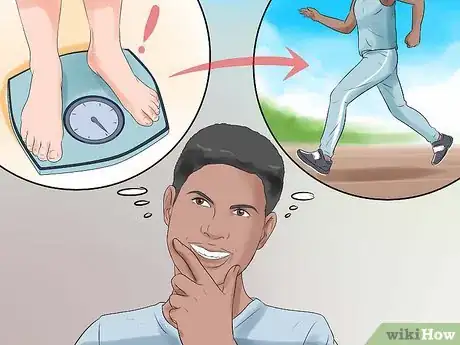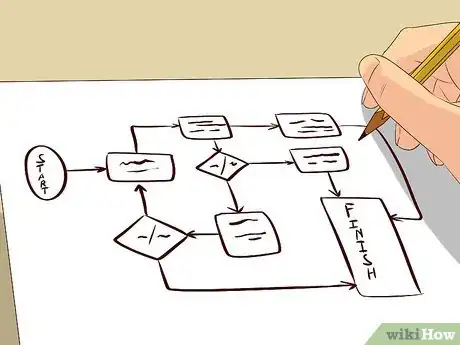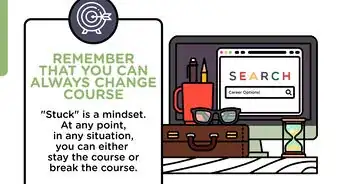This article was co-authored by Annie Lin, MBA. Annie Lin is the founder of New York Life Coaching, a life and career coaching service based in Manhattan. Her holistic approach, combining elements from both Eastern and Western wisdom traditions, has made her a highly sought-after personal coach. Annie’s work has been featured in Elle Magazine, NBC News, New York Magazine, and BBC World News. She holds an MBA degree from Oxford Brookes University. Annie is also the founder of the New York Life Coaching Institute which offers a comprehensive life coach certification program. Learn more: https://newyorklifecoaching.com
There are 12 references cited in this article, which can be found at the bottom of the page.
wikiHow marks an article as reader-approved once it receives enough positive feedback. In this case, 91% of readers who voted found the article helpful, earning it our reader-approved status.
This article has been viewed 39,646 times.
It's easy to get dragged down by the day-in and day-out of living an ordinary life. But perhaps an ordinary life isn't for you; you crave happiness and fulfillment every day. It’s important to know that everyone's definition of "perfect" is different, and having a completely perfect life can only happen moments at a time. However, you can get an idea of what your "perfect" life looks like and work toward achieving what makes you happy.
Steps
Working Toward Your Goals
-
1Brainstorm some goals. Setting goals can help you achieve more and improve your life.[1] Try to think of a goal that will challenge you, but is still attainable. Think about things that make you happy, then create goals around those things.Think about short-term and long-term goals, and make them measurable.
- Create goals for different areas of your life: career, romantic relationship, family, travel, fun, personal growth.
- Goals can include traveling, going to college/grad school, making dietary changes such as going vegan, or learning an extreme sport, such as paragliding. Be creative! Think about the things that immediately put a smile on your face.
- If you’ve always wanted to visit the Amazon jungle, set that goal! It doesn’t matter how “far off” the goal appears.
-
2Create attainable (SMART) goals. Make sure the goals you set can actually come true for you and are not so unrealistic that you can never reach them. Use the S.M.A.R.T. system to set goals that are attainable and motivating. If your goals are too out there (like "I want to be the first human to live on Pluto"), you can actually experience a decrease in motivation and desire for improvement. To get the most out of your goals, they should fit these criteria :
- Specific: Goals should be clear and as specific as possible, and answer these questions: who is involved, what do I want to accomplish, where must this be done, when should it be performed? So, instead of "Get fit," your goal might be "Lose 15 lbs. before my vacation to Hawaii."
- Measurable: You must be able to measure or quantify your goal with concrete criteria. This way you will be able to see your progress and you will know when you've met your goal. With the weight-loss goal of 15 lbs., you can track your progress pound by pound and, once you've lost those 15 lbs., you know you have achieved your goal.
- Achievable/Attainable: Use your common sense to decide whether or not you can realistically meet this goal. It should require you to stretch yourself and make changes, but shouldn't be something wildly out of reach. Think about the skills and knowledge you have now and what you might need to learn in order to achieve your goal. Think about your past and whether the goal is simply a stretch or if it is unrealistic.
- Relevant: Ask yourself why you want to achieve this goal, and if it will be fulfilling for you. Getting a law degree at Harvard might be achievable for you, but is this really what you want? If your passion lies with the culinary arts, maybe a better goal is to move to France for a year and learn to cook. Consider the other things going on in your life and whether they align with your goals.
- Time bound: You must set an end point for your goal. It shouldn't be vague (like "by this summer") but a point that can be found on a calendar ("by June 15th"). Having a specific timeframe can give you a sense of urgency and motivate you to keep on track.
Advertisement -
3Determine the ways to attain your goals. Sometimes it’s not enough to just think about your goals. For each goal, write the steps you need to take in order to attain the goal. Think about ways to break down each goal into smaller, measurable parts.[2] You want to set yourself up for success so you don’t find yourself discouraged that none of your goals are coming to fruition.
- If your goal is to visit the Amazon jungle, your steps may include setting 5% of each paycheck aside to save up for the trip for 14 weeks, saving up vacation days, choosing the dates to go, and booking the flights and trip.
- If your goal is to become a vegetarian, think about what steps you need to get there. You may create steps such as talking to other people who are vegetarians, looking at health/environment information, buying some cookbooks, cutting out red meat, and then cutting out all meat.
-
4Write down your goals. Once you’ve thought through your goals and the steps you need to attain them, write them down! You want to make your goals memorable and meaningful so that you can realistically work toward them. You can write them on a piece of paper, or you can get creative and create a vision board. Make it interactive and get engaged with your goals. Make it colorful, and put some effort into it. You want to create something that excites you and motivates you.[3]
- Use magazine clippings or paint your goals. Use resources from the internet to help you create your board.
Practicing Happiness
-
1Don’t wait. If you truly want to live your life, no excuse is powerful enough to keep you from living your dreams. No regret is worth having, and it truly is never too late to start pursuing your happiness.
-
2Be yourself. Remove all the layers of who you think you are, or who you’ve been told you are, and be yourself. It may take some time to find yourself, and that’s ok. You find it’s painful to let go of the person you thought you were, and that’s ok, too. Becoming closer to your authentic self will allow you to live your life in more fulfilling ways.[4] One way to get in touch who you are is realizing your personal values. Your values can be principles, beliefs or ideas that guide your life, such as a spiritual commitment, adherence to a vegan diet or social/environmental issues, or social values such as honesty, integrity, and compassion. Think about what guides your life and align with those things.
- If you value creativity and art, yet find yourself crunching numbers for a living, you may not be living in alignment with who you are. Consider adding more art and creativity into your life, or pursuing a career that allows you to be creative.
- Think about who you are when you are at your happiest and when you feel most authentic.
- If you need help, check out How to Be Yourself.
-
3Manage your stress. Inconveniences happen every day, and it’s easy to become frustrated by the roadblocks in the way. Take a deep breath, and remember that you can and will move past each situation. Don’t sweat the small stuff, and don’t sweat the big stuff, either. When in the throes of difficulty, remind yourself that soon enough, it will be nothing more than a memory. Learn your body’s cues of stress (muscle tension, difficulty sleeping, difficulty concentrating) and find ways to combat stress in the moment.[5]
- Try yoga, mini-meditations, positive self-talk, prayer, deep breathing, or play.
- To learn more about managing stress, check out How to Reduce Stress, How to Relieve Stress, and How to Deal With Stress.
-
4Surround yourself with great friends. Having good friends in your life gives you a sense of belonging, sense of self-worth, and support. Good friends give you love and support to encourage your decisions and help to handle stress and difficult times. Having friends is an important part of emotional health and happiness.[6]
- If your friendships feel unfulfilling, connect with people through a shared interest. Love meditation? Attend a meditation workshop or join a sitting group. Always wanted to rock climb? Check out gyms and climbing festivals and where to learn how to climb. You’ll meet people that share the same interests, and instantly connect.
-
5Commit to getting good sleep. Countless problems are associated with lack of sleep, including mental fogginess, difficulty losing weight, memory and concentration deficits, decreased sex drive, and impaired judgment.[7] For you to live a full, happy, fulfilling life, get enough sleep! Don’t let anything compromise your snooze time.
- Shoot to get seven to ten hours of sleep each night (or if you’re a teen, 8-10 hours).[8]
- If you struggle to fall asleep, check out How to Sleep Better for tips.
Changing Your Mentality
-
1Reach beyond your comfort zone. If you’re living within your comfort zone, know that there’s a lot of life you’re missing. Some indicators of living only within your comfort zone include feeling bored, restless, tired, dissatisfied, and lacking enthusiasm for life. The good news is that it doesn’t have to stay this way! Find ways to do things that feel uncomfortable. Do the things you’ve never done but always wanted to do. Think about what scares you, then go tackle it. Remember that you’ve already tackled many fears in your life, and that you are capable of tackling whatever is in front of you. Don’t let fear hold you back.
- It’s hard to get over the fear of stepping out of what feels comfortable. Take some baby steps, start small and celebrate your successes. Get inspired by other people who have stepped out of their comfort zone and thrived, then know that you can do it, too!
- Staying within your comfort zone in fear of embarrassment limits and deprives your life of the fun you can experience. Step out of it with courage and boldness; who cares what others think of you? Be yourself, and do what you want.
- Check out How to Step Out of Your Comfort Zone for more tips.
-
2Be present. Mindfulness practices encourage being in the present moment and benefit your physical and mental health.[9] Being mindful means engaging your senses and observing your thoughts without judgment. Feel the ground beneath you when you walk, listen to the sounds around you, taste each bite of food you eat, engage your sense of smell, and observe your surroundings with your eyes. Use your senses to the fullest instead of letting them run on autopilot. Then, practice mindfulness on your thoughts and emotions, consciously observing each without judgment.[10]
- When you taste food, devote your thought processes to the food. Take a moment to smell the food, and notice how your body reacts to the smell. Then, put the food in your mouth, but don't chew yet. Observe the texture and the flavors. As you begin to chew, notice how it feels between your teeth and on your tongue.
- Notice when you become distracted, and bring yourself back to the moment with your senses. Let your thoughts take a break and engage with your environment.
-
3Give gratitude. It’s time for you to move the Thanksgiving turkey aside and get into the practice of giving thanks daily. Grateful people exhibit health and happiness benefits, such as sleeping better, having increased empathy and decreased aggression, improved self-esteem, and improved physical and psychological health.[11]
- Begin and end each day by observing three things for which you are grateful. Connect with the feeling of gratitude, don’t list things you have. The less material your focus, the better. Be grateful for your friends, for the ability to walk to the market, and the feeling of the sun on your shoulders.
-
4Have a good attitude. Always look on the positive side of all situations, no matter what! Even if the situation seems entirely negative, there has got to be some positive in it, big or small. A good attitude will help you get through many of life’s difficulties. Having a positive outlook is associated with health and psychological benefits, such as lower rates of depression and distress and having a longer lifespan.[12]
- When you notice negative thoughts, observe them, then choose to think of something positive. For instance, combat thoughts like, “I’ll mess this up; I’ve never done it before!” with “I am so proud of myself for giving myself the opportunity to try something new.”[13]
- If you’ve really embarrassed yourself and feel like your life is over, tell yourself, “Everything will pass and eventually blow over. Britney Spears shaved her head and had a public meltdown, and nobody seems to care about that anymore, so nothing will follow me forever.”
-
5Avoid perfectionism. Remember that what feels perfect lasts only moments. Don’t cheat yourself out of a happy life by trying to make it "perfect," because an entirely perfect life is unattainable (and probably unenjoyable). Perfectionism can create unhappiness and an inability to celebrate your successes as not being “good enough.” Perfectionists can fall in a trap of having a fear of failure or a fear of taking risks.[14]
- For example, if you’re trying to learn a new language, the best way to jump in is by speaking. It can be terrifying to speak a foreign language, but accept that you will make mistakes and learn from them. Improvement often requires risk, and it’s okay to make mistakes!
- Recognize that even things that look like mistakes or failures can be learning experiences for growth. If you encounter setbacks, don't give up: tell yourself, "Now I'm more aware of what doesn't work," and try something different.
-
6Realize that your version of a “perfect life” will continue to change. And that’s ok! When you are 30, your version of a perfect life may be living in a different country and learning a different culture; at 32 it may change and your perfect life may include adopting a baby. Don’t get too attached to what you thought your perfect life was, but be flexible and adaptable to it changing. Changes are part of the adventure.
Expert Q&A
-
QuestionHow can I design my perfect life?
 Annie Lin, MBAAnnie Lin is the founder of New York Life Coaching, a life and career coaching service based in Manhattan. Her holistic approach, combining elements from both Eastern and Western wisdom traditions, has made her a highly sought-after personal coach. Annie’s work has been featured in Elle Magazine, NBC News, New York Magazine, and BBC World News. She holds an MBA degree from Oxford Brookes University. Annie is also the founder of the New York Life Coaching Institute which offers a comprehensive life coach certification program. Learn more: https://newyorklifecoaching.com
Annie Lin, MBAAnnie Lin is the founder of New York Life Coaching, a life and career coaching service based in Manhattan. Her holistic approach, combining elements from both Eastern and Western wisdom traditions, has made her a highly sought-after personal coach. Annie’s work has been featured in Elle Magazine, NBC News, New York Magazine, and BBC World News. She holds an MBA degree from Oxford Brookes University. Annie is also the founder of the New York Life Coaching Institute which offers a comprehensive life coach certification program. Learn more: https://newyorklifecoaching.com
Life & Career Coach Start with your key goal in life. Rate how satisfied you are in different areas of your current life, and see if you need to make adjustments. If there's something you can improve, jot down 2-3 actionable ways you can work towards improving it. Figure out what gives you joy, meaning, and fulfillment. Start taking responsibility and choose to change your experience in life.
Start with your key goal in life. Rate how satisfied you are in different areas of your current life, and see if you need to make adjustments. If there's something you can improve, jot down 2-3 actionable ways you can work towards improving it. Figure out what gives you joy, meaning, and fulfillment. Start taking responsibility and choose to change your experience in life.
References
- ↑ https://www.mindtools.com/page6.html
- ↑ http://topachievement.com/smart.html
- ↑ Annie Lin, MBA. Life & Career Coach. Expert Interview. 25 November 2019.
- ↑ https://www.psychologytoday.com/articles/200804/dare-be-yourself
- ↑ https://www.psychologytoday.com/blog/prescriptions-life/201310/10-secrets-living-vibrantly-happy-healthy-life
- ↑ http://www.mayoclinic.org/healthy-lifestyle/stress-management/in-depth/social-support/art-20044445
- ↑ http://www.webmd.com/sleep-disorders/excessive-sleepiness-10/10-results-sleep-loss?page=3
- ↑ https://sleepfoundation.org/sleep-topics/teens-and-sleep
- ↑ http://www.helpguide.org/harvard/benefits-of-mindfulness.htm
- ↑ http://www.helpguide.org/harvard/benefits-of-mindfulness.htm
- ↑ https://www.psychologytoday.com/blog/what-mentally-strong-people-dont-do/201504/7-scientifically-proven-benefits-gratitude
- ↑ http://www.mayoclinic.org/healthy-lifestyle/stress-management/in-depth/positive-thinking/art-20043950
- ↑ Annie Lin, MBA. Life & Career Coach. Expert Interview. 25 November 2019.
- ↑ http://greatergood.berkeley.edu/raising_happiness/category/main_dish/undefined/P180












































































